– contributed by Tony Pankuch.
When I set out to write a post for the CCHP blog in celebration of Pride Month, I knew that I wanted to focus on documents written by rather than about members of the LGBTQ+ community. Like many marginalized groups, LGBTQ+ individuals are often depicted as passive participants in our own struggle for equal rights. Without diminishing the important work of allies such as Dr. Evelyn Hooker, it is important to remember that there were also psychologists within the LGBTQ+ community speaking up and working tirelessly in support of themselves and their loved ones.
So, imagine my delight upon finding numerous materials relating to the Association of Gay Psychologists (AGP).
The AGP was created in 1973 in response to the 1972 Annual Convention of the American Psychological Association (APA). Founding member Dr. Steven Morin provided some background on these events in the AGP’s inaugural newsletter:
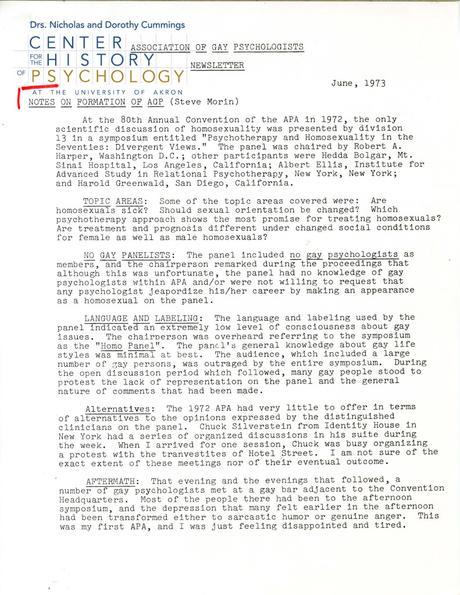 Society for the Psychological Study of Social Issues (SPSSI) Archives, Box 754, Folder 6
Society for the Psychological Study of Social Issues (SPSSI) Archives, Box 754, Folder 6The panel [on homosexuality] contained no gay psychologists as members, and the chairperson remarked during the proceedings that although this was unfortunate, the panel had no knowledge of gay psychologists within the APA and/or were not willing to request that any psychologist jeapordize [sic] his/her career by making an appearance as a homosexual on the panel.
That evening and the evenings that followed, a
number of gay psychologists met at a gay bar adjacent to the Convention Headquarters. … This was my first APA, and I was just feeling disappointed and tired.
1972 was a big year for psychology, psychiatry, and the gay liberation movement. It was the year that Dr. John E. Fryer, otherwise known as “Dr. Anonymous,” concealed his identity to speak at the American Psychiatric Association’s panel on homosexuality. Tensions over the continued classification of homosexuality as a mental illness within the DSM-II were nearing their peak. Take a look at the language used by Boston’s Gay Male Liberation in their 1972 statement to the Eastern Psychological Association:
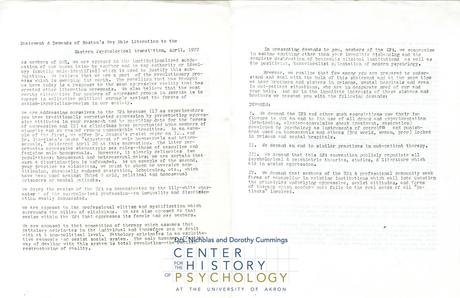 Eastern Psychological Association records, Box 1037, Folder 3
Eastern Psychological Association records, Box 1037, Folder 3In presenting demands to you, members of the EPA, we compromise in asking anything other than your immediate disbanding and the complete destruction of bourgeois clinical institutions as well as the positivist, behavioralist orientation of modern psychology.
Strong words. It was in this post-Stonewall environment of vocal activism that Morin, along with Dr. Martin Rogers and Barbara Bryant of Sacramento State College, set out to form the AGP.
So what did they do? To get the rest of the narrative, we can turn to the January 1975 Newsletter of Psychologists for Social Action. It’s the “Gay Issue.”
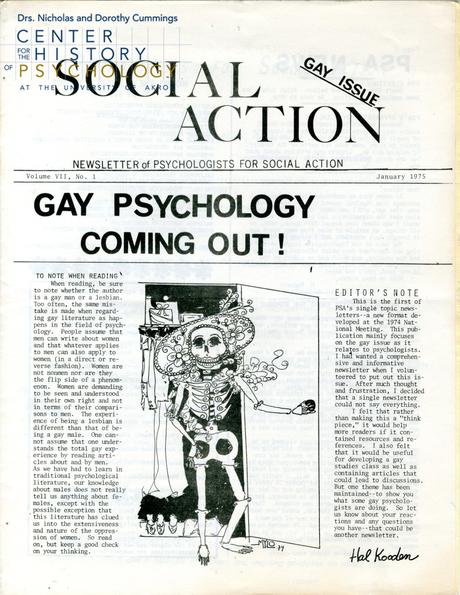 Cummings Center for the History of Psychology Special Interest, “Psychologists for Social Action – Newsletters”
Cummings Center for the History of Psychology Special Interest, “Psychologists for Social Action – Newsletters”Personal aside: As a nonbinary trans person, I’ve never felt more represented in the archives than I do by this newsletter’s fanciful skeletons.
The newsletter contains a full history of the AGP up to that point.
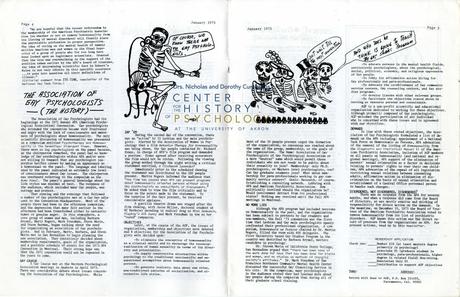
There’s a lot happening here, so let’s break it down piece by piece (setting the skeletons aside for the moment).
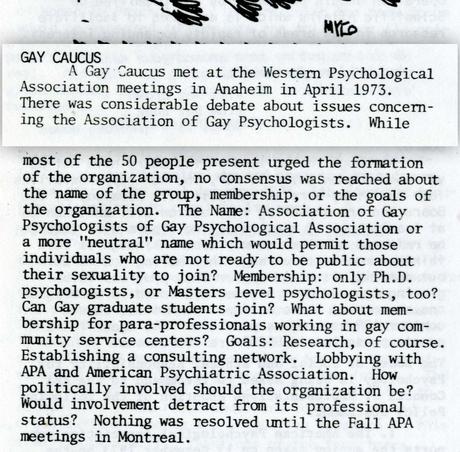
The Western Psychological Association meetings of 1973 were the AGP’s first major planning session. As you can see above, things didn’t go smoothly. A number of issues arose, but one that stands out immediately is the concern over “outing” gay psychologists.
In the early 1970s, it was hard to speak out for gay liberation as an openly gay psychologist, because psychologists just weren’t supposed to be gay. Many in the profession sincerely viewed homosexuality as an illness incompatible with psychological or psychiatric practice. This is why John E. Fryer was forced to speak in disguise as “Dr. Anonymous” in 1972. Publicly outing himself would have amounted to the end of his career.
It took until the Fall 1973 APA Convention for the AGP to really come together. Here, they succeeded in making a radical improvement in gay representation:
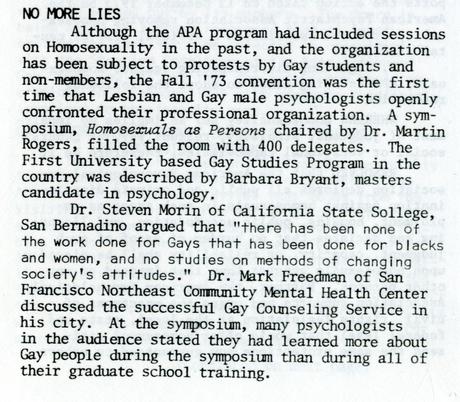
Day two got even better…
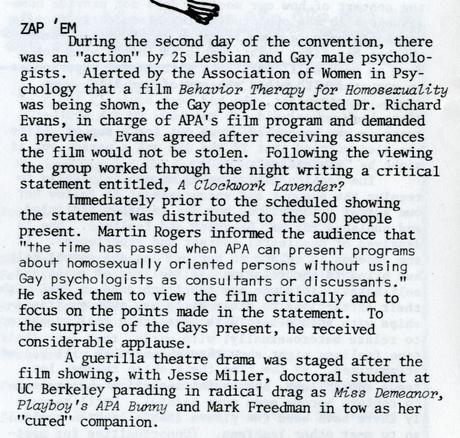
That’s right. The AGP responded to the offensive film Behavior Therapy for Homosexuality with not just a critical statement, but with a whole guerrilla drag performance. “Miss Demeanor, Playboy’s APA Bunny.” I am in awe.
From there, the AGP formulated a list of objectives for their organization and demands for the APA. Among their objectives was “to eliminate the conception of homosexuality as a clinical entity and encourage the reconceptualization of human sexuality in terms of its diversity and potential.”
Did they succeed? In part, yes.
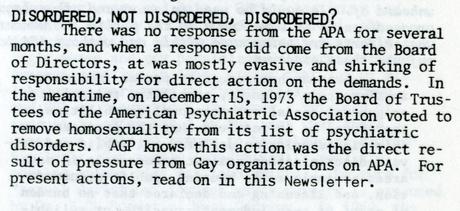
The actions of the AGP and other Gay Liberation groups demonstrate the importance of direct action, visibility, and community in effecting social change. The collective action of these groups strengthened the voices of their individual members, allowing them to speak out openly for themselves. Their fate was no longer exclusively in the hands of their straight colleagues. Though there was still much more progress to be made for the LGBTQ+ community in the mental health fields (particularly for members of the transgender community), the 1973 removal of homosexuality from the DSM-II was a landmark accomplishment.
The AGP would continue to work for further progress for the LGBTQ+ community, and in 1983 changed its name to the Association of Gay and Lesbian Psychologists (AGLP). Their full archival records are currently held by Cornell University Library. Steve Morin went on to became an important figure in HIV/AIDs research, serving as director of the Center for AIDS Prevention Studies (CAPS). You can read a 2017 retrospective on his career here.
So in the future, if anyone ever tries to tell you…
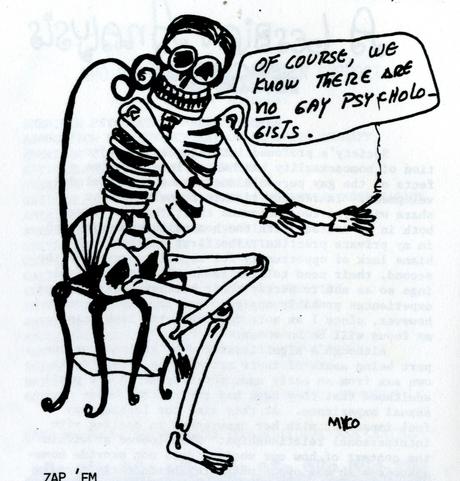
…give them a little history lesson about Dr. Morin and the AGP.
If you’d like to see more of the 1975 “Gay Issue” of the Newsletter of Psychologists for Social Action, you can read the full document here.
